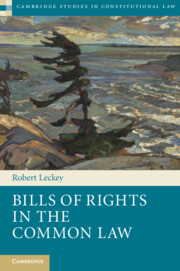Book contents
- Frontmatter
- Dedication
- Contents
- Acknowledgements
- Table of cases
- Introduction
- 1 Against bill-of-rights exceptionalism
- 2 The common law, judging, and three bills of rights
- 3 Judicial review of legislation before bills of rights
- 4 Bills of rights and other means of accessing judgment
- 5 Putting the strike-down in its place
- 6 Remedies from text to practice
- 7 Improving the system and engaging the legislature
- 8 Rethinking remedies and constitutional supremacy
- Conclusion
- Bibliography
- Index
Conclusion
Published online by Cambridge University Press: 05 May 2015
- Frontmatter
- Dedication
- Contents
- Acknowledgements
- Table of cases
- Introduction
- 1 Against bill-of-rights exceptionalism
- 2 The common law, judging, and three bills of rights
- 3 Judicial review of legislation before bills of rights
- 4 Bills of rights and other means of accessing judgment
- 5 Putting the strike-down in its place
- 6 Remedies from text to practice
- 7 Improving the system and engaging the legislature
- 8 Rethinking remedies and constitutional supremacy
- Conclusion
- Bibliography
- Index
Summary
This book has sustained four major arguments. The first delineates what is genuinely novel about subjecting legislation to review for compliance with a bill of rights. Bill-of-rights exceptionalism seems to lead many researchers, wrongly, to take the judicial function of reviewing legislation and declaring it invalid as new. Scholars' sense that the chief novelty under a bill of rights lies in subjecting legislation to review may account for their overlooking the truly new elements of rights adjudication, which instead relate to what this book has called the how of rights review. Some such procedural and technical elements depart substantially from the record of practice before the bills of rights.
Although all elements of change in rights adjudication are germane to an account of the new instrument's impact on the legal system, they differ in their source and significance. In some cases, the bills of rights authorize such departures, as in the examples of rights-respecting interpretations in the UK and of delayed and prospective declarations in South Africa. In others, they do not, as in the case of such declarations in Canada. Departures from pre-bill-of-rights practice initiated by judges reveal a bolder self-conception than do ones that the bill of rights authorized.
Moreover, tracking developments with an eye to whether the bill of rights authorized them adds a crucial analytical layer to comparisons of the practices. Doing so can help to avoid potentially misleading characterizations of judicial behaviour. For example, scholars describe the South African Constitutional Court as ‘activist’, but when one maps the record of practice onto the constitutionally assigned powers, it emerges that the Supreme Court of Canada has exercised greater judicial agency. The view of reviewing legislation and declaring its invalidity as radically new detracts from attention to these elements and distinctions amongst them. Bill-of-rights exceptionalism also associates judicial innovation too tightly with a bill of rights, overlooking innovations that predated the rights instrument, such as the UK and Canadian judges' transformation of standing in the public interest.
- Type
- Chapter
- Information
- Bills of Rights in the Common Law , pp. 191 - 198Publisher: Cambridge University PressPrint publication year: 2015



